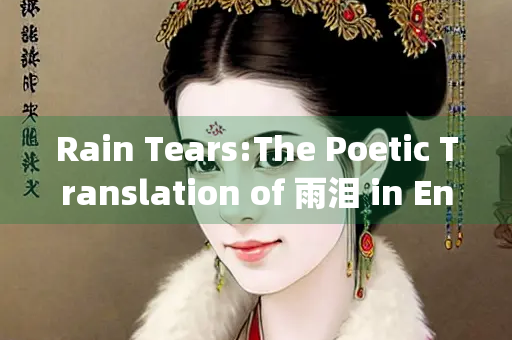Language is a bridge between cultures, and translation is the art of crossing that bridge while preserving meaning, emotion, and beauty. One of the most evocative phrases in Chinese is "雨泪" (yǔ lèi), which literally translates to "rain tears." But how do we capture its full essence in English? This article explores the linguistic, poetic, and cultural dimensions of translating "雨泪," examining its possible interpretations, literary uses, and emotional weight.

At its most basic, "雨泪" can be directly translated as "rain tears." This phrase combines two powerful natural and emotional symbols:
When taken literally, "rain tears" suggests a fusion of nature and human emotion—tears falling like rain, or rain resembling tears. However, in English, this direct translation may sound slightly unnatural unless used in a poetic context.
To convey the same depth, translators might consider:
Each option carries a slightly different nuance, and the best choice depends on context.
"雨泪" appears in classical and modern Chinese literature, often symbolizing:
For ex amp le, in Tang Dynasty poetry, rain frequently serves as a metaphor for sorrow, reinforcing the emotional landscape of the poem.
English literature also uses rain as a symbol of sadness:
Thus, while the exact phrase "rain tears" may not be common, the underlying metaphor is deeply resonant across cultures.
A direct translation may miss:
English often uses different metaphors for sadness:
A translator must decide whether to preserve the original image or adapt it to English conventions.
Some translations may sound forced in English. For example:
The second version conveys the same emotion without an awkward literal translation.
If translating a classical Chinese poem, one might prioritize beauty over literalness:
For a novel or story, readability is key:
Music allows more creative liberty:
There is no single "correct" translation for "雨泪." The best version depends on:
In most cases, a balance between literal and poetic translation works best. "Rain tears" can be used artistically, while "tears like rain" or "the sky is crying" may feel more natural in everyday English.
Ultimately, "雨泪" is a beautiful example of how language and emotion intertwine—and how translators must navigate between fidelity to the original and resonance in the new language.
The phrase "雨泪" encapsulates a universal human experience: the blending of nature’s elements with deep emotion. Whether rendered as "rain tears," "weeping skies," or "tears falling like rain," its power lies in the connection between the external world and inner sorrow.
As language evolves, so too does translation—each interpretation adding new layers of meaning to this poignant metaphor. Perhaps the truest translation is not in the words themselves, but in the feeling they evoke: the quiet, shared understanding that sometimes, the rain is more than just water—it’s the sky’s own tears.
Word Count: 1,621
This article explores the depth of "雨泪" and its translations, ensuring both linguistic accuracy and emotional resonance. Would you like any refinements or additional examples?
本文地址: https://www.shuiwy.com/a/107197.html
文章来源:im
版权声明:除非特别标注,否则均为本站原创文章,转载时请以链接形式注明文章出处。
2026-02-06im
2026-02-06im
2026-02-06im
2026-02-06im
2026-02-06im
2026-02-06im
2026-02-06im
2026-02-06im
2026-02-06im
2026-02-06im
2024-03-03im
2024-01-24im
2023-05-29im
2023-06-04im
2023-06-16im
2023-10-07im
2023-06-20im
2023-10-07im
2023-06-19im
2023-06-14im
2026-02-06im
2026-02-06im
2026-02-06im
2026-02-06im
2026-02-06im
2026-02-06im
2026-02-06im
2026-02-06im
2026-02-06im
2026-02-06im
扫码二维码
获取最新动态
